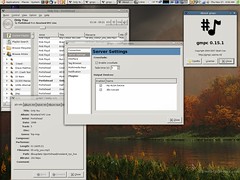So a week or so ago I posted about setting up a music server based on MPD. The whole setup has been running along for a few days now, and so far I’m impressed.
There were still some loose ends from the original install. One was getting audio streaming working properly (the initial install was just playing through my Bose Lifestyle system via a patch cable). I wanted to be able to stream audio to laptops and other computers. This required setting up Icecast – a feat not as complex as I feared. Icecast is in the Ubuntu package archives, so installing it was just a matter of “aptitude install icecast2”.
 Configuring Icecast and MPD was pretty simple as well – I followed a few references on the net, and had it running in about 10 minutes.
Configuring Icecast and MPD was pretty simple as well – I followed a few references on the net, and had it running in about 10 minutes.
One of the other changes I did was moved from using Sonata to using GMPC from Qalaxy. I found it has a much better interface and is more comprehensive in it’s functionality.
The other client I installed is called ‘Pitchfork’ – a PHP + Ajax based web client. Unfortunately, it appears to have gone into abandonware mode, and it’s website is down. I found someone on #mpd on Freenode that had a copy of it, and I installed that directly. It’s a handy, decent web front end that has the added bonus of having a built in audio streamer – so you can listen to the Icecast stream directly via the browser. Nifty.
The rest of my time has been taken up importing music. I had various music archives lying around, and of course my own fairly hefty CD collection. Ripping CD’s seems to go fairly well using Grip – even so, it’s a slow process. Fortunately I can do it while doing other things – I just haul down one of my cd books, and start feeding them to the laptop. When I finish a few gigs, I copy the entire directory over to the server, and tell MPD to update.
dbs@yawl:~$ mpc stats Artists: 1459 Albums: 2066 Songs: 25235 Play Time: 2 days, 16:12:08 Uptime: 3 days, 12:05:52 DB Updated: Fri Nov 28 22:15:14 2008 DB Play Time: 73 days, 7:11:13
I’ve introduced the roommates to the server, and pointed out how they can listen to music stored there. Having only one audio stream is going to be a problem as more folks are interested in listening to what is stored there, but for now, being able to save and update shared playlists and switching the current music around remotely is a big enough win, I’m not going to worry about the next stages until after we move.

 For those who missed the first Give One Get One program, the
For those who missed the first Give One Get One program, the 